Student Seminar at Tanigawa to Review A Practical Moral Textbook for University Students: How Do You Think and How Do You Act?
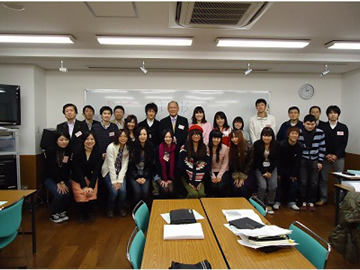
A brainstorming session involving faculty, staff members and students working to compile this new textbook of “Moral Science” took place at Reitaku University’s Tanigawa Seminar House on Thursday, December 23 and Friday, December 24, 2010.
The purpose of the seminar was to elicit opinions and input from student reviewers about the draft chapters recently completed by professors in charge of teaching “Moral Science” and President Osamu Nakayama (President, CMSE Director). The end product is to be A Practical Moral Textbook, which will supplement A Moral Textbook for University Students — How Do You Live Your Life? that has been in use in “Moral Science” classes since April, 2009.
The 26 participants at the seminar (16 students and 10 faculty and staff members) were divided into 6 teams, each of which consisted of one faculty member and 2 to 3 students charged with reviewing two or more chapters.
Opening the seminar, President Nakayama greeted participants by saying; ”I understand that the purpose of this brainstorming session is for all of us to join together to think about forms of morality that are practicable. I believe we all know the theory here, but I want to ask all of you to take the manuscript of “A Practical Moral Textbook” as your point of departure and ponder what kind of things actually matter when it comes to moral practice, what kind of examples of this exist, and what it is that we need to focus on. Your work here is not simply a matter of compiling a textbook, but represents a wonderful opportunity to contribute to the good of your fellow students at Reitaku University by putting to use all the experience, knowledge, and learning you have accumulated to date.” Students responded by expressing their hopes and intentions of making a contribution to the finished version of the textbook, especially in fleshing out the action plans in the last chapter, so that the end product would be unique, the most original moral textbook in the world. Each group then eagerly set to work exchanging opinions and analysis.
On the second day, members of each group made presentations outlining the opinions that had emerged from the review process initiated during the brainstorming session the previous day. Student contributions included comments such as: “What is happiness? This session made me think about this subject in great depth”; “I came to understand how the really important issues are surprisingly close to us and how many of us tend to forget this”; and “I thought again about the meaning of volunteering.” Problem areas in the manuscripts were identified in comments such as: “It is difficult to understand by and large”; “It is difficult to imagine a situation like this because no detailed examples are given”; “The textbook failed to convey a clear message to me”; and “I feel we need more detailed explanations of words and phrases,” among others.
Faculty members responded to what they had heard in the following terms: “I learnt a great deal from this session”; “It was not easy to explain my feelings to those on the other side of the generation gap”; “I applaud the students for being so well prepared. I only wish we could have a little more time for discussion”; and “This session made me focus on whether our ideas will really lead to effective moral practice.”
The Editor of Reitaku University Press then gave his impression of proceedings; “I have been privileged to listen to some extremely valuable opinions today. We will work to incorporate the insights offered at this seminar in our forthcoming revision of the manuscripts.”
In bringing the seminar to a close, President Nakayama offered the following remarks; ”We have been able to exchange opinions freely on the preparation of A Practical Moral Textbook and I have been impressed by your wonderful presentations over the course of this seminar. I believe our work here will result in the completion of the finest moral textbook in Japan.” He concluded by expressing his gratitude to all concerned and solicited their continued cooperation in the final stages of preparing A Practical Moral Textbook.
The volume is now going through the editing stage, during which the opinions elicited at the seminar will be incorporated in the book, and this phase is to be completed by around the end of March 2013.
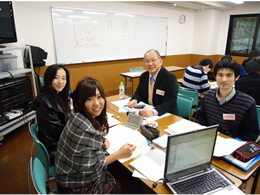
Opinions being exchanged by group members
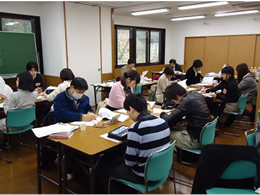
Opinions being exchanged by group members
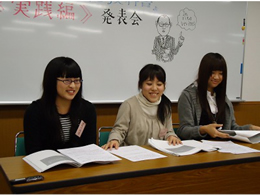
A presentation
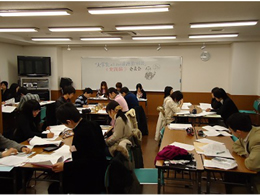
A presentation



